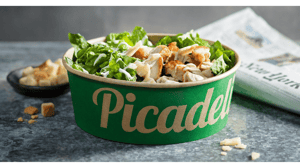CHILI SUSPECTED IN TEXAS BOTULISM OUTBREAK
FORTH WORTH, Texas -- After at least ten people were hospitalized with botulism or suspected botulism, a salvage warehouse serving primarily low-income customers was closed by the Texas Department of Health, Austin, once it was discovered to be the common link among those who got sick from eating frozen chili purchased there.The U.S. Department of Agriculture issued notice on Sept. 3 that a Texas
September 17, 2001
BARBARA MURRAY
FORTH WORTH, Texas -- After at least ten people were hospitalized with botulism or suspected botulism, a salvage warehouse serving primarily low-income customers was closed by the Texas Department of Health, Austin, once it was discovered to be the common link among those who got sick from eating frozen chili purchased there.
The U.S. Department of Agriculture issued notice on Sept. 3 that a Texas firm, Classic Foods, Fort Worth, had voluntarily recalled approximately 15,000 pounds of frozen chili that may be contaminated with botulinum toxins, which cause botulism, a rare but serious paralytic illness. This was a Class I recall, denoting a high health risk, the USDA said. There were no deaths, but seven adults and three children in Texas were hospitalized, according to spokespersons for the Texas Department of Health. Three others had milder symptoms and did not require hospitalization, said one spokeswoman, Emily Palmer.
"We don't think the contamination took place during the manufacturing process; the food handling practices at the store are being investigated," said another spokesman, Doug McBride.
Everyone who got sick ate chili bought at a Fort Worth salvage operation called Town Talk Foods, 121 N. Beach here, Palmer said. The store was closed Sept. 6 by an emergency order of the state Department of Health, Palmer said. Town Talk Foods did not return a phone call from SN.
One Classic Foods product, called Sheriff Blaylock's Best Chili, is packed in 5-pound tubs, and is primarily a food-service product, according to Rick Kellam, vice president of Classic Foods. Over the course of a week, the state department of health modified its warning, limiting it to two lot numbers of the Sheriff Blaylock's, and one lot number of Texas Chili Company's One-Step Heat and Eat brand. That manufacturer is also based here, and did not return calls by SN.
The Blayock's chili was produced March 27 and distributed to retail and wholesale stores in Colorado, Pennsylvania, Texas and Washington state, according to the Food Safety and Inspection Service of the USDA. Kellam said his company sells to distributors in the food-service channel, not to retail food stores. However, USDA spokeswoman Carol Blake said distributors sold the chili to retail and wholesale stores.
Palmer told SN that workers at the salvage store would take the frozen chili of both brands out at about 7:30 a.m. and leave it unrefrigerated until between 2 and 4 p.m., when they would put any that was unsold back into the freezer.
"They charge low prices, and the people who shop there are low-income,"Palmer said.
Palmer said the health department had inspected the store in the past, but somehow missed this practice, which apparently was only followed on Saturdays.
Classic Foods voluntarily ceased operations on Monday, Sept. 3, to assist the federal, state and local agencies that were inspecting the plant, Kellam told SN. "We had some of the top experts from USDA and other governmental agencies in here going through our facility with a fine-tooth comb. We were confident they would find no problem with our production. It was a case of temperature abuse somewhere along the line," he said.
He added that Classic Foods does not package or offer a retail product, nor does it sell to salvage companies.
Production resumed Friday, Sept. 7, according to Kellam and Blake of the USDA's Food Safety and Inspection Service.
"Our thoughts and prayers go out to the individuals who were affected. It's a regrettable incident," said Kellam.
About the Author
You May Also Like




